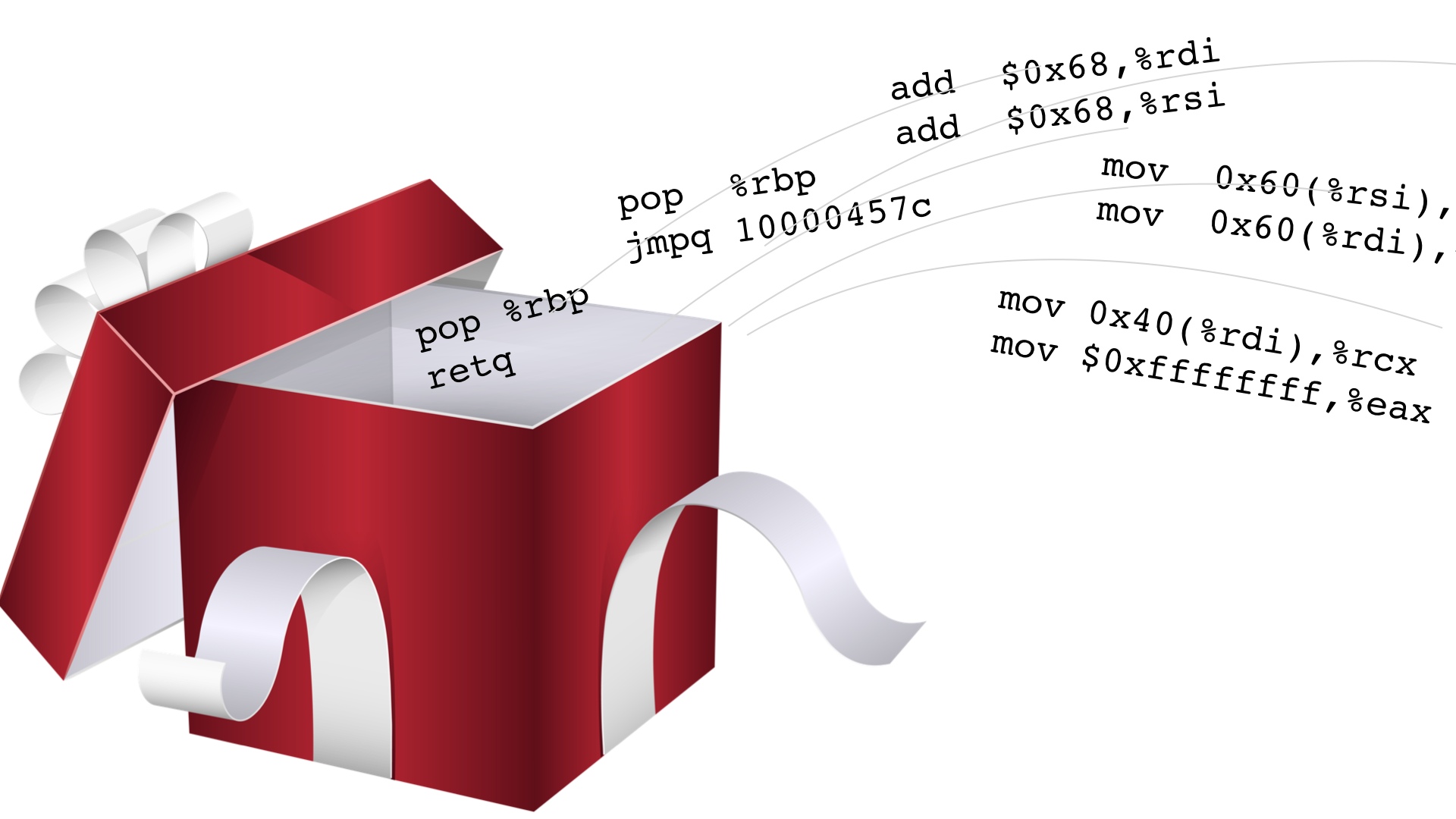

This transformation translates a function F into a new function F' consisting
of a sequence of intermediate code instructions such
that, when F' is executed, F will be dynamically compiled
to machine code. I.e., this is an example of
runtime code generation, or just-in-time compilation,
or dynamic unpacking.
For example, the first few lines of a jitted function may look like this:
int fac(int x ) {
...
p3 = jit_init();
jit_enable_optimization(p3, 3L);
label4 = jit_get_label(p3);
jit_add_prolog(p3, & _3_obf_int_binary_I___foo, 0);
localSize6 = jit_allocai(p3, 8L);
jit_add_op(p3, JIT_DECL_ARG, ((0 << 4) | (2 << 2)) | 2, 0, 4, 0L, 0L, 0);
jit_add_op(p3, JIT_DECL_ARG, ((0 << 4) | (2 << 2)) | 2, 0, 4, 0L, 0L, 0);
jit_add_op(p3, JIT_ADD | 2, ((2 << 4) | (1 << 2)) | 3, 0 | ((0 << 1) |
(1 << 4)), 0 | ((2 << 1) | (0 << 4)), (jit_value )(localSize6 + 4), 0L, 0);
jit_add_op(p3, JIT_GETARG, ((0 << 4) | (2 << 2)) | 3, 0 | ((0 << 1) |
(2 << 4)), 1L, 0L, 0L, 0);
jit_add_op(p3, JIT_ST | 1, ((0 << 4) | (1 << 2)) | 1, 0 | ((0 << 1) |
(1 << 4)), 0 | ((0 << 1) | (2 << 4)), 0L, 4, 0);
jit_add_op(p3, JIT_ADD | 2, ((2 << 4) | (1 << 2)) | 3, 0 | ((0 << 1) |
(3 << 4)), 0 | ((2 << 1) | (0 << 4)), (jit_value )(localSize6 + 0), 0L, 0);
jit_add_op(p3, JIT_GETARG, ((0 << 4) | (2 << 2)) | 3, 0 | ((0 << 1) |
(4 << 4)), 0L, 0L, 0L, 0);
jit_add_op(p3, JIT_ST | 1, ((0 << 4) | (1 << 2)) | 1, 0 | ((0 << 1) |
(3 << 4)), 0 | ((0 << 1) | (4 << 4)), 0L, 4, 0);
...
jit_generate_code(p6);
...
result58 = (*fac_foo)(x);
return (result58);
}
Intermediate code operators (the JIT_MOV, JIT_EQ, etc. in the
example above) are randomized every time Tigress is invoked. Thus, the
statement
op11 = jit_add_op(p6, JIT_JMP | 2, ((0 << 4) | (0 << 2)) | 2, 0, 0L, 0L, 0L);
may be compiled into
op11 = jit_add_op(p6, 42, 2, 0, 0L, 0L, 0L);
where "42" will be a different literal for every invocation.
There is no diversity in the dynamically generated code at this point; i.e., every time the program is run, the same code is generated.
In earlier versions of Tigress, in order to invoke this feature you had to add one of the following directives to the top of your C file, depending on which target you were compiling for:
The files can be found in Tigress' distribution directory. Starting with 4.0.9 this is no longer necessary.
If you set the option --JitFrequency=n for n>0, the
function will be jitted every n:th time it is called. This
means that every n:th time the function is called, its
address trace (but not its instruction trace) will change. With
--JitFrequency=0, the function will only be jitted the
first time it is called.
To disrupt dynamic taint analysis, the option --JitImplicitFlow
inserts implicit flow between where the function gets generated, and where it is invoked:
int fac(int x ) {
...
fac_foo1 = IMPLICIT_FLOW(fac_foo);
result58 = (*fac_foo1)(x);
return (result58);
}
As usual, this transformation needs to be combined with others to break up
the predictable static structure. The Split and Virtualize
transformations are particularly appropriate.
| Option | Arguments | Description |
|---|---|---|
| --Transform | Jit | Turn a function into a sequence of instructions that dynamically builds up the function at runtime. |
| --JitEncoding | hard, soft | How the jitted instructions are encoded. Default=hard.
|
| --JitFrequency | INTSPEC | How often to jit the code at runtime. 0=only the first time; n>0=Every n:th time the function is called. Default=0. |
| --JitOptimizeBinary | INTSPEC | Optimize the jitted binary code. 1=omit frame pointer, 2=omit unused assignments, 4=merge ADDs and MULs. Default=1|4=5. |
| --JitImplicitFlow | S-Expression | The type of implicit flow to insert. See --AntiTaintAnalysisImplicitFlow for a description. Default=none. |
| --JitCopyKinds | counter, counter_signal, bitcopy_unrolled, bitcopy_loop, bitcopy_signal, * | Comma-separated list of the kinds of implicit flow to insert. counter_signal and bitcopy_signal require that --Transform=InitImplicitFlow --InitImplicitFlowCount=... has been called to create the signal handlers. Default=all options.
|
| --JitObfuscateHandle | BOOLSPEC | Add an opaque predicate to the generated function handle. Default=false. |
| --JitObfuscateArguments | BOOLSPEC | Add bogus arguments and opaque predicates to the jit_add_op function calls. Default=false. |
| --JitDumpOpcodes | INTSPEC | Print the jitter's bytecode. OR the numeric arguments together, or 0 for no dumping. Default=0.
|
| --JitTrace | INTSPEC | Insert runtime tracing of instructions. Set to 1 to turn it on. Default=0. |
| --JitTraceExec | BOOLSPEC | Annotate each instruction, showing from where it was generated, and the results of execution. Default=false. |
| --JitDumpTree | BOOLSPEC | Print the tree representation of the function, prior to generating the jitting code." Default=false. |
| --JitDumpCFG | BOOLSPEC | Print the jitter's Control Flow Graph. Default=false. |
| --JitAnnotateTree | BOOLSPEC | Annotate the generated code with the corresponding intermediate tree code instructions." Default=false. |
| --JitDumpIntermediate | BOOLSPEC | Print the generated intermediate code at translation time." Default=false. |
| --JitRandomizeBlocks | BOOLSPEC | Randomize the order of basic blocks Default=true. |
jit_ prefix. These functions need also to be
obfuscated in order to protect the jitted function itself.
ADD than,
say, a DIV instruction.
double instead.
These are issues with jitted code that will probably never be resolved:
__builtin_* functions cannot
be jitted since these have to be called directly. This
includes functions that call, for example, alloca
implicitly (this is taken from gcc's torture test 920721-2.c):
f(){}
main(){int n=2;double x[n];f();exit(0);}
This feature of Tigress is based on the MyJit library by Petr Krajča. We are indebted to Petr for his hard work modifying MyJit to fit our needs.